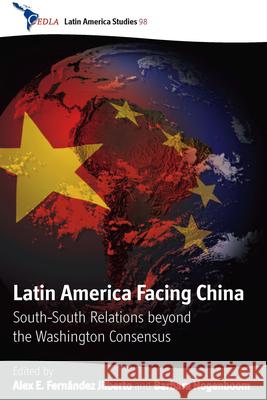Latin America Facing China: South-South Relations Beyond the Washington Consensus » książka
Latin America Facing China: South-South Relations Beyond the Washington Consensus
ISBN-13: 9781845457396 / Angielski / Twarda / 2010 / 216 str.
Latin America Facing China: South-South Relations Beyond the Washington Consensus
ISBN-13: 9781845457396 / Angielski / Twarda / 2010 / 216 str.
(netto: 485,11 VAT: 5%)
Najniższa cena z 30 dni: 498,70
ok. 30 dni roboczych.
Darmowa dostawa!
The last quarter of the twentieth century was a period of economic crises, increasing indebtedness as well as financial instability for Latin America and most other developing countries; in contrast, China showed amazingly high growth rates during this time and has since become the third largest economy in the world. Politically, China presents itself more prominently on the international stage, stressing its position as a developing country and seeking new alliances, including South-South alliances. Based on several case studies, this volume assesses how China's rise-one of the most important recent changes in the global economy-is affecting Latin America's national politics, political economy, and regional and international relations. Several Latin American countries benefit from China's economic growth by means of commodity exports, rising prices, and Chinese investment. Furthermore, China's new role in international politics has been helpful to many leftist governments' efforts in Latin America to end the Washington Consensus. The contributors to this thought-provoking volume examine these and the other causes, effects, and prospects of Latin America's experiences with China's global expansion from a South-South perspective.
The last quarter of the twentieth century was a period of economic crises, increasing indebtedness as well as financial instability for Latin America and most other developing countries; in contrast, China showed amazingly high growth rates during this time and has since become the third largest economy in the world. Politically, China presents itself more prominently on the international stage, stressing its position as a developing country and seeking new alliances, including South-South alliances. Based on several case studies, this volume assesses how Chinas rise-one of the most important recent changes in the global economy-is affecting Latin Americas national politics, political economy, and regional and international relations. Several Latin American countries benefit from Chinas economic growth by means of commodity exports, rising prices, and Chinese investment. Furthermore, Chinas new role in international politics has been helpful to many leftist governments efforts in Latin America to end the Washington Consensus. The contributors to this thought-provoking volume examine these and the other causes, effects, and prospects of Latin Americas experiences with Chinas global expansion from a South-South perspective.











